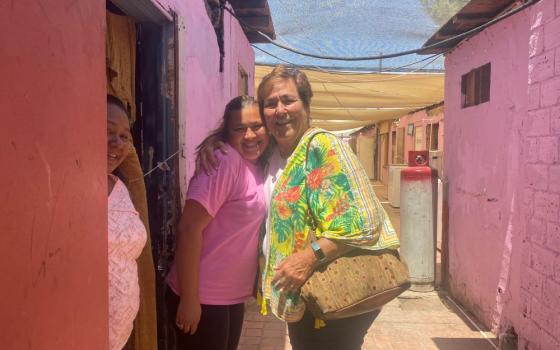WASHINGTON -- Church leaders urged members of Congress and the Bush administration to keep the human and ethical dimensions of the economic crisis in mind as they craft a financial bailout package for Wall Street.
"This crisis involves far more than just economic or technical matters, but has enormous human impact and clear ethical dimensions which should be at the center of debate and decisions on how to move forward," said Bishop William F. Murphy of Rockville Centre, N.Y., in a Sept. 26 letter to Treasury Secretary Henry Paulson and key House and Senate leaders.
Bishop Murphy, who chairs the U.S. bishops' Committee on Domestic Justice and Human Development, also stressed responsibility, accountability, awareness of the advantages and limitations of the market, subsidiarity, solidarity and the common good in the search for just and effective responses to the economic crisis.
The House of Representatives rejected a $700 billion compromise bailout package Sept. 29.
The economic crisis and proposed bailout also drew comment from the president of Catholic Charities USA, a Catholic representative at the Interfaith Center on Corporate Responsibility and a former Vatican official.
Bishop Murphy's letter was harsh in its assessment of the circumstances that led to the economic crisis.
"The scandalous search for excessive economic rewards even to the point of dangerous speculation that exacerbates the pain and losses of the more vulnerable are egregious examples of an economic ethic that places economic gain above all other values," he said.
"Sadly, greed, speculation, exploitation of vulnerable people and dishonest practices helped to bring about this serious situation," Bishop Murphy added. "Those who directly contributed to this crisis or profited from it should not be rewarded or escape accountability for the harm they have done."
He also called for "protection of the vulnerable -- workers, business owners, homeowners, renters and stockholders" in any economic bailout and said renewed "instruments of monitoring and correction within economic institutions and the financial industry," as well as greater public regulation and protection, will be necessary.
Father Larry Snyder, president of Catholic Charities, said in Sept. 25 letters to the leadership of the House and Senate that any financial bailout for Wall Street "must include economic relief for the hardships of Main Street."
Any plan to rescue the nation's banking and financial system must ensure "that those with the least do not bear the greatest burden in this crisis," he said.
"We urge Congress to remember the low- and middle-income Americans whose lives and economic security are being shattered by the current economic crisis," he added.
Specifically, Father Snyder said, the plan should extend unemployment insurance; increase Food Stamp benefits; protect low-income families from losing Medicaid and social service assistance; and increase home energy assistance.
"While we fully appreciate the potential dangers for our nation's economic stability if we fail to act to secure our financial system, we also understand that the road to long-term recovery must include assisting poor and low-income families who are suffering the direct effects of this economic crisis in the form of rising utility, energy, food and housing costs," said the president of the Alexandria, Va.-based network of Catholic charitable agencies and institutions.
"We ask that you keep those families in mind and champion their needs as you move to develop a truly comprehensive economic recovery package," Father Snyder added.
Father Seamus Finn, who has represented his community, the Oblates of Mary Immaculate, at the Interfaith Center for Corporate Responsibility for many years, said any financial bailout must not "impose additional burdens on the marginalized and poorest who are at the periphery of the workings of financial markets."
It also must address the "root causes of the meltdown," while also "restoring credibility to the financial market in a transparent manner at the lowest possible cost to the taxpayers without bailing out shareholders or management via golden parachutes," Father Finn said.
Archbishop Diarmuid Martin of Dublin, Ireland, commented on the international ramifications of the economic crisis in a Sept. 28 opinion piece in The Mail on Sunday, a Dublin newspaper.
"Economic growth always brings with it social responsibility," he wrote. "(The market) can only function in an ethical and judicial framework where the vulnerable are protected and the natural arrogance of the powerful is curbed."
"Irresponsible traders do not just gamble with the future of a big multinational firm -- they eventually affect the lives of people all over the world," added Archbishop Martin, who served in the 1990s as secretary of the Pontifical Council for Justice and Peace at the Vatican.
The Franciscan Action Network also urged its members to contact their members of Congress about the financial-bailout package, asking them to "reflect on our culture's tendency toward excess and immediacy."
"These root causes, along with the fate of persons on the margins, may escape the notice of legislators in a hurry," the network said in an "emergency action alert" e-mailed to its members. "Therefore it is our responsibility to share the wealth of our Franciscan perspective with them."
The alert did not list specific recommendations for the economic-bailout package.



